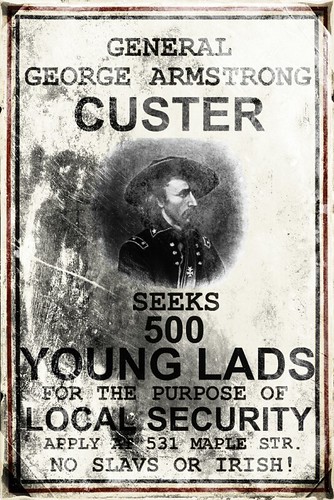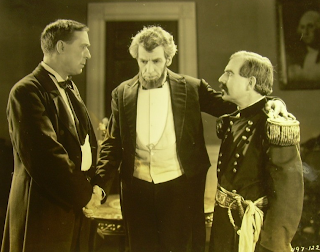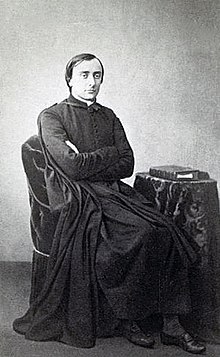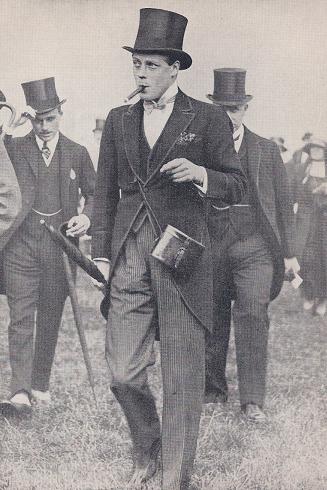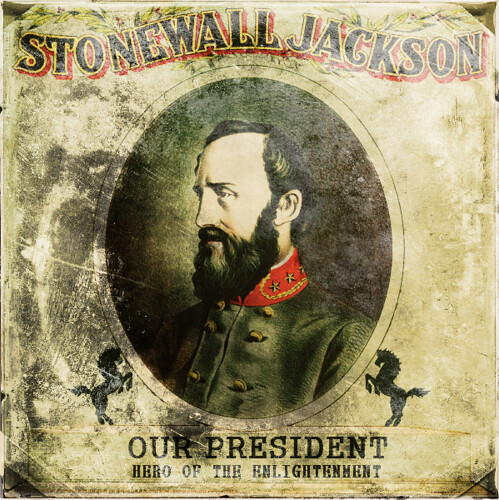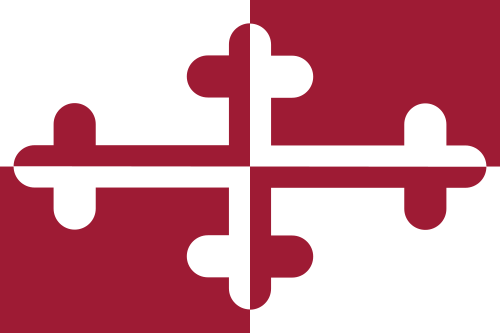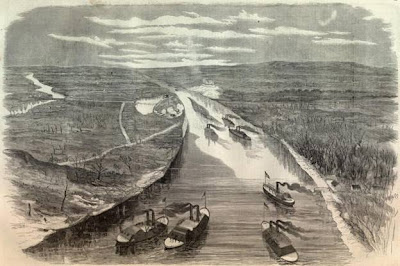ONWARD CHRISTIAN SOLDIER
THE BIOGRAPHY OF GEORGE ARMSTRONG CUSTER
PART TWO
George Armstrong Custer was, in 1864, the youngest and most eccentric general in the Union Army. Thanks to his personal friendship with both Edward Everett and the Burr Family, he had risen through the ranks in a blatant act of favoritism and corruption. Having had no war to fight since the annexation of Vermont, it should have taken Custer decades to attain the amount of influence he had at age 25. Since most days consisted of nothing but drilling and other mundane, boring tasks, Custer grew weary of his Philadelphia abode and set out to his old evangelist stomping grounds in Shicagwa. Upon arrival in October of 1864, Custer expressed admiration of Goodyear's running of things, and particularly noted the clockwork efficiency of the Colonel Goodyear Enterprises Workplace Security Force. It was this that planted an idea in his head: why not use a similar private army to patrol not just the industrial areas of the city, but the whole city or state?
"Tom, I have come up with a brilliant plan. Come join me in Shicagwa, and bring Boston with you. The Custer boys are about to strike it rich!"
-excerpt from Custer's letter to his brother Thomas, December, 1864
In the spring of 1865, George, Thomas, and Boston started their work. George handed in his resignation for active duty and joined the Army Reserve, and he and his brothers launched Custer's Company, a mercenary force of the most intimidating roughnecks they could dig up. A huge advertizing campaign swept through the entire state of Iowai, and the organization's rank swelled to 500 by July, meeting the Company's goal. A new goal of another 500 was set, and by Christmas of 1865, the Custer Brothers were proud commander of 2,000 soldiers. By mid-1870, recruiting campaigns were launched state-wide, from Shicagwa to Indianapolis to Vincennes, and the palatial Custer's Company Headquarters stood on Burr Avenue, the most expensive real estate in town. By that point, over 8000 men belonged to the company, and it was beginning to spill over into neighboring states.
The Company's official mission was to "Secure a Better way of life for the Betters of Society." This term, "Betters of Society," became widespread, meaning generally "White Anglo-Saxon Protestants." The American Standard Dictionary soon created the term "Inferiors of Society" to mean "most foreigners, especially Irish, Slavs, Italians, Polocks, Catholics, Orthodoxers of any type, Amish, Hindoos, Ancestor-Worshipers, and Mohammedans. Of note is the fact that Frenchmen and Germans can be Inferiors if Papist, but those who have accepted true Christianity are generally not considered Inferiors." Curiously, Negroes were not listed as Inferiors. This was due to the Union's staunch Abolitionist heritage and their constant once-upping over the "unenlightened" South. Another group curiously left out were the Jews. Anti-Union pundits said it was because of the many Jewish bankers and businessmen who held sway within the Union economy, including Goodyear Enterprises Economic Affairs Officer (EAO) Benjamin Bernbaum. Both Negro and Jewish citizens were afforded most of the liberties that were deprived of the so-called Inferiors, and their small numbers allowed them to go largely unnoticed in society as a whole. The caste system had truly begun.
Custer's Company took over where the CGEWSF left off. The Union's police force was woefully under-equipped and the Military Police only covered the heavily urbanized centers, and then only mostly in the east. This left the Midwest small towns and villages without "firm law enforcement." Custer's Company was paid by these towns to come in and maintain "order" and shove the "Inferiors" into ghettos, and the Company would then use part of that money to pay their "employees." Long wagon trains stretched into the Ohio region, where the infamous "reeducation camps" awaited the Inferiors most unwilling to admit their inferiority and "mind their God-given Places below the Betters of Society."
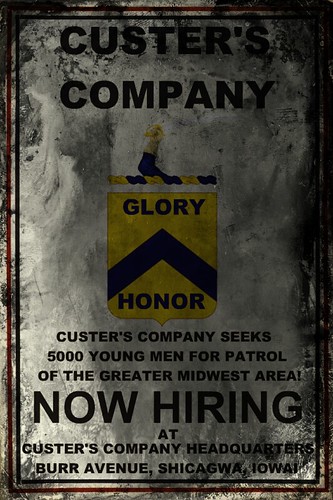
George Custer eventually bought out his two brothers' shares in the company (1875), and Thomas and Boston then lived the good life as rich men in the growing city of Oshkosh, Michigania. By 1875, George Custer was one of the wealthiest men in the Union and the most popular, behind only Goodyear. The government began officially sanctioning his activities and at least 500 Custer's Company troops marched in the annual Christmas Eve ("Remembrance Day") parades in Philadelphia every year. Eventually, Custer's men were even helping to guard the Canadian border. George was presented with the Order of Patriotic Brethren Medallion for his "gallant service to God, Country, and Future Generations." Children worshiped him, men wanted to be him, and women were known to faint just at the site of him in the room. His trademark long golden locks and pointed mustache, as well as his bravado and charisma, made him an ideal face for the Union. Little did anyone know that about 25 years in the future, he would be far more than just the face of the Union; he would be its first real "enlightened despot."
Photograph of General Custer (far right) with First Chief Consul Aaron Burr III and Chief of Military Police A. A. Lincoln during a meeting at Independence Hall (Remembrance Day, 1890). Lincoln died a month later (January 3rd, 1891).
When England's Victoria had married Russia's Crown Prince Alexander in 1840, things seemed to be going up for the Hanoverian clan. When, after decades of mockery and torment at the hands of their mentally-deficient kings, Victoria became queen in 1857 (upon King Edward's death at age 90), things looked even better. But behind the scenes, a problem was brewing: Victoria's son Viktor, future King of England and Czar of Russia. To put it bluntly, Viktor was taking after his great-grandfather George III, only with more psychotic tendencies, like Uncle George IV. He was consistently abusive to his butlers and servants, and repeatedly cursed at English civilians protesting the "damnable monarchy."
Viktor's ego soared in 1865, when his grandfather Nicholas II died at 69, and he became Crown Prince of Russia at age 24. He was appointed general in the Russian Imperial Army, and began to suggest attacking neighbors to his father, the much more balanced and fair Alexander. Viktor's favorite subject was Persia. He insisted that Persia was on a list that Napoleon II was compiling of future targets. Operating on a "make Persia Russian before it goes French" tactic, he urged for an invasion. Whenever Alexander refused, Viktor would go into an almost epileptic fit and rage for hours.
Alexander tried to keep his son's mental illness from public light and made the Russian people happy by 1868 Abolition of Serfdom, but Viktor was getting out of hand. He began to make plans to skip Viktor in the line of succession and give the throne to one of his other sons, either Alexander (born 1842), Nicholas (born 1844), or Paul (born 1845). When the day came to make it official, Czar Alexander feared it would push Viktor over the edge.
Back in England, Viktor was consistently giving the people a reason to hate him utterly. Aside from the aforementioned public cursing-out of English citizens, his tyrannical attitude and general rudeness made him a hated figure in his mother's court. In 1868, he was seen with multiple women in his private quarters at night, and when two of them turned up dead the next day, and a third a week later, all the fingers pointed to Viktor.
The English monarchy was teetering on collapse from that point onward. Thanks to Viktor seemingly rejecting every possible marriage that came his way and with constant rumors of his affairs with prostitutes leaking out on an almost daily basis, it was in 1870 that Czar Alexander decided once and for all to strip Viktor of his crown. The day before the announcement was going to be made public, Princes Alexander and Nicholas were killed when a bomb was thrown under their carriage while pulling up to the entrance of the Moscow Opera. The horrific assassination was immediately blamed on "Filthy Anarchists," but those who knew of the Czar's plan to skip Viktor knew Viktor had found out and had had his own brothers murdered.
The Moscow Opera Bombing of 1870: Prince Nicholas (far left, limp) lays dying, while Prince Alexander (center, prone) has already been killed by shrapnel to the head.
These events left the youngest brother, Paul, as the only heir left besides Viktor, and Paul had demonstrated that he was almost mentally retarded (though not quite), and could barely carry on a conversation, let alone manage the Russian Empire. With great sadness, Alexander saw he could do nothing to keep his mad son from inheriting the throne. He loved all of children very dearly, despite their faults, and the pain of losing two of them plagued him to his grave in 1890. Victoria would join him soon after.
Before anyone cries ASB, don't worry, Russia and England won't be merging at all.

I'm pretty sure you can tell what England is planning... *hint hint* Even if they did merge, England is a minor nation in this; it isn't Great Britain.
